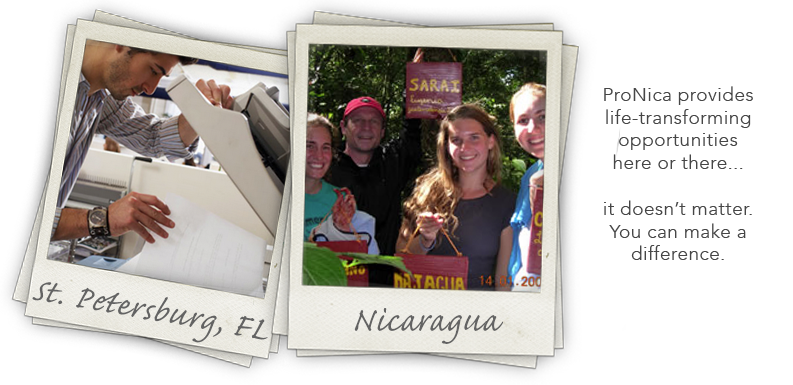Volunteers

Volunteers with our partner and affiliate communities in Nicaragua are accepted based on volunteer skills and interests and our partners’ needs. Those interested in volunteering, please contact us [stateside].
Volunteers in Nicaragua must speak fluent (or near-fluent) Spanish and commit to a minimum of two months of service. Language is a requisite since most volunteers will be in placements where no one speaks English. For those who do not speak Spanish, we would be happy to recommend excellent Spanish schools, like Hijos del Maiz in the community of El Lagartillo, where students get on-on-one tutoring while sharing in life in the rural cooperative.
 We are happy to receive summer interns supported by colleges and universities, especially within the context of a particular course of study. We require that volunteers come with open minds, willing to learn from our grassroots partners, all of whom are life-long community activists with much to teach.
We are happy to receive summer interns supported by colleges and universities, especially within the context of a particular course of study. We require that volunteers come with open minds, willing to learn from our grassroots partners, all of whom are life-long community activists with much to teach.
It is often not possible to outline the details of a particular project in advance. Volunteers should be prepared for last-minute changes to their work. It’s essential for volunteers to have a high level of flexibility and patience. Most community organizations are over-worked and understaffed. Volunteers who are most successful are able to support ongoing and long-term projects rather than those who try to initiate something new that might not outlive the volunteer’s time in the community. Volunteers must also be prepared for conditions in Nicaragua, like the heat, bugs, and the noise levels. They must be in good mental and physical health.
We require that any health concerns, including physical health issues, dietary restrictions, severe allergies, and mental health conditions, be discussed with ProNica in advance. This information remains confidential. We must decline a volunteer if we cannot ensure that proper care facilities and conditions are accessible in Nicaragua and in the specific (and sometime remote) community a volunteer will be working in. When special conditions are manageable and care accessible in Nicaragua, we are happy to work with applicants to meet their special needs.
ProNica invites potential volunteers of all races, genders, sexual orientations, nationalities, religions, ideologies, and physical abilities to apply. Placements with community organizations is determined by a discussion between the volunteers (once accepted), the particular community organization, and ProNica. We often place volunteers with ProNica’s partner organizations, and other affiliate organizations in our network.

Potential applicants are encouraged to discern what leads them to volunteer in Nicaragua, their goals in doing so, and how their volunteer time might fit into the trajectory of their spiritual journey. Quaker volunteers may find it helpful to convene a Clearness Committee of two or more people to support this discernment. ProNica is happy to provide guidelines and key questions for this process.
Application Process
Potential volunteers complete an application and provide three letters of reference. The Volunteer Committee reviews all applicants for suitability of service and project partner needs. Once all documents are received by the stateside office, you will be informed of acceptance in about one to two weeks.
Prior to the commencement of service, volunteers submit a medical evaluation signed by a physician, proof of international insurance for the duration of volunteer service and a liability release.
There is a one-time sliding-scale contribution of $300-$650 for volunteer placements. This contribution offsets our volunteer placement costs, allowing us to channel donor support directly to our Nicaraguan partner organizations and their vital community development projects.
Volunteers fund all of their own expenses. The ProNica staff in Nicaragua facilitates orientation, volunteer assignments and housing. We are in regular contact with volunteers to advise them in addition to their on-site supervisor.
